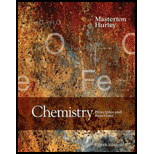
Chemistry: Principles and Reactions
8th Edition
ISBN: 9781305079373
Author: William L. Masterton, Cecile N. Hurley
Publisher: Cengage Learning
expand_more
expand_more
format_list_bulleted
Concept explainers
Question
Chapter 20, Problem 9QAP
Interpretation Introduction
Interpretation:
The volume of air should be obtained in cubic feet which will react with the coke under given condition of 25 ? and 1.00 atm should be determined.
Concept introduction:
The conversion factor for metric ton is:
Number of moles is obtained as:
Where n is number of moles, m is given mass, and M is molar mass.
To obtain the volume of gases, the ideal gas equation is used as:
Where P is pressure, T is temperature, n is number of moles, R is gas constant, and V is volume of gas.
Expert Solution & Answer
Want to see the full answer?
Check out a sample textbook solution
Students have asked these similar questions
Is the chemical reaction CuCl42-(green) + 4H2O <==> Cu(H2O)42+(blue) + 4Cl- exothermic or endothermic?
If we react tetraethoxypropane with hydrazine, what is the product obtained (explain its formula). State the reason why the corresponding dialdehyde is not used.
drawing, no ai
Chapter 20 Solutions
Chemistry: Principles and Reactions
Ch. 20 - Write a balanced equation to represent the...Ch. 20 - Write a balanced equation to represent the...Ch. 20 - Write a balanced equation to represent (a) the...Ch. 20 - Prob. 4QAPCh. 20 - Prob. 5QAPCh. 20 - Prob. 6QAPCh. 20 - Prob. 7QAPCh. 20 - Prob. 8QAPCh. 20 - Prob. 9QAPCh. 20 - Zinc is produced by electrolytic refining. The...
Ch. 20 - Prob. 11QAPCh. 20 - Prob. 12QAPCh. 20 - Prob. 13QAPCh. 20 - Prob. 14QAPCh. 20 - Prob. 15QAPCh. 20 - Prob. 16QAPCh. 20 - To inflate a life raft with hydrogen to a volume...Ch. 20 - What mass of KO2 is required to remove 90.0% of...Ch. 20 - Prob. 19QAPCh. 20 - Prob. 20QAPCh. 20 - Prob. 21QAPCh. 20 - Prob. 22QAPCh. 20 - Balance the following redox equations. (a)...Ch. 20 - Balance the following redox equations. (a)...Ch. 20 - Prob. 25QAPCh. 20 - Prob. 26QAPCh. 20 - Prob. 27QAPCh. 20 - Using Table 17.1 (Chapter 17) calculate E° for (a)...Ch. 20 - Using Table 20.4, calculate, for the...Ch. 20 - Prob. 30QAPCh. 20 - Prob. 31QAPCh. 20 - Prob. 32QAPCh. 20 - Prob. 33QAPCh. 20 - The equilibrium constant for the reaction...Ch. 20 - Using data in Appendix 1, estimate the temperature...Ch. 20 - A 0.500-g sample of zinc-copper alloy was treated...Ch. 20 - Prob. 37QAPCh. 20 - Prob. 38QAPCh. 20 - Iron(II) can be oxidized to iron(III) by...Ch. 20 - Prob. 40QAPCh. 20 - Prob. 41QAPCh. 20 - Rust, which you can take to be Fe(OH)3, can be...Ch. 20 - Prob. 43QAPCh. 20 - Prob. 44QAPCh. 20 - Prob. 45QAP
Knowledge Booster
Learn more about
Need a deep-dive on the concept behind this application? Look no further. Learn more about this topic, chemistry and related others by exploring similar questions and additional content below.Similar questions
- If CH3COCH2CH(OCH3)2 (4,4-dimethoxy-2-butanone) and hydrazine react, two isomeric products are formed. State their structure and which will be the majority.arrow_forward+ Reset Provide the correct IUPAC name for the compound shown here. 4-methylhept-2-ene (Z)- (E)- 1-6-5-2-3-4- cyclo iso tert- sec- di tri hept hex oct meth eth pent ane yne ene ylarrow_forward+ Provide the correct IUPAC name for the compound shown here. Reset H3C H H C CH3 CH-CH3 1-3-methylpent ene trans- cis- 5-6-3-1-2-4- tert- tri sec- di cyclo iso but pent hex meth prop eth yl ane ene yne ☑arrow_forward
- drawing, no aiarrow_forwarddrawing, no aiarrow_forwardDraw the major organic product when each of the bellow reagents is added to 3,3-dimethylbutere. ✓ 3rd attempt Part 1 (0.3 point) H.C CH CH + 1. BHG THF 210 NaOH NJ 10000 Part 2 (0.3 point) HC- CH HC 2741 OH a Search 1. He|DA HO 2. NIBH さ 士 Ju See Periodic Table See Hint j = uz C H F F boxarrow_forward
arrow_back_ios
SEE MORE QUESTIONS
arrow_forward_ios
Recommended textbooks for you
 Chemistry: The Molecular ScienceChemistryISBN:9781285199047Author:John W. Moore, Conrad L. StanitskiPublisher:Cengage Learning
Chemistry: The Molecular ScienceChemistryISBN:9781285199047Author:John W. Moore, Conrad L. StanitskiPublisher:Cengage Learning General Chemistry - Standalone book (MindTap Cour...ChemistryISBN:9781305580343Author:Steven D. Gammon, Ebbing, Darrell Ebbing, Steven D., Darrell; Gammon, Darrell Ebbing; Steven D. Gammon, Darrell D.; Gammon, Ebbing; Steven D. Gammon; DarrellPublisher:Cengage Learning
General Chemistry - Standalone book (MindTap Cour...ChemistryISBN:9781305580343Author:Steven D. Gammon, Ebbing, Darrell Ebbing, Steven D., Darrell; Gammon, Darrell Ebbing; Steven D. Gammon, Darrell D.; Gammon, Ebbing; Steven D. Gammon; DarrellPublisher:Cengage Learning ChemistryChemistryISBN:9781305957404Author:Steven S. Zumdahl, Susan A. Zumdahl, Donald J. DeCostePublisher:Cengage Learning
ChemistryChemistryISBN:9781305957404Author:Steven S. Zumdahl, Susan A. Zumdahl, Donald J. DeCostePublisher:Cengage Learning Chemistry: An Atoms First ApproachChemistryISBN:9781305079243Author:Steven S. Zumdahl, Susan A. ZumdahlPublisher:Cengage Learning
Chemistry: An Atoms First ApproachChemistryISBN:9781305079243Author:Steven S. Zumdahl, Susan A. ZumdahlPublisher:Cengage Learning
 Chemistry: Principles and PracticeChemistryISBN:9780534420123Author:Daniel L. Reger, Scott R. Goode, David W. Ball, Edward MercerPublisher:Cengage Learning
Chemistry: Principles and PracticeChemistryISBN:9780534420123Author:Daniel L. Reger, Scott R. Goode, David W. Ball, Edward MercerPublisher:Cengage Learning

Chemistry: The Molecular Science
Chemistry
ISBN:9781285199047
Author:John W. Moore, Conrad L. Stanitski
Publisher:Cengage Learning

General Chemistry - Standalone book (MindTap Cour...
Chemistry
ISBN:9781305580343
Author:Steven D. Gammon, Ebbing, Darrell Ebbing, Steven D., Darrell; Gammon, Darrell Ebbing; Steven D. Gammon, Darrell D.; Gammon, Ebbing; Steven D. Gammon; Darrell
Publisher:Cengage Learning

Chemistry
Chemistry
ISBN:9781305957404
Author:Steven S. Zumdahl, Susan A. Zumdahl, Donald J. DeCoste
Publisher:Cengage Learning

Chemistry: An Atoms First Approach
Chemistry
ISBN:9781305079243
Author:Steven S. Zumdahl, Susan A. Zumdahl
Publisher:Cengage Learning


Chemistry: Principles and Practice
Chemistry
ISBN:9780534420123
Author:Daniel L. Reger, Scott R. Goode, David W. Ball, Edward Mercer
Publisher:Cengage Learning